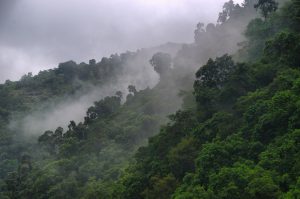So What Just Happened at the Climate Talks?
Based on our team’s reports from Katowice, our take at Forest Trends is that negotiators have signed off on a promising, but incomplete, set of rules for implementing the Paris Agreement, which is best understood as a global framework for capturing and accelerating ambition.

19 December 2019 | I’m writing this post from Washington, DC, where we just experienced the wettest year on record. In Paris, officials struggle to contain violent protests triggered by a fuel tax increase designed to cut greenhouse gas emissions. Residents of Canada, Sweden, and the US West are still picking up the pieces after record-breaking wildfire seasons. In other words, we are seeing the signs that climate change is going to be painful – and there’s no avoiding that.
This was the context of the global climate talks in Katowice, Poland, which wrapped up their 24th year-end summit this past weekend, just as word broke that greenhouse-gas emissions had jumped another 3 percent in 2018, the steepest rise in seven years.
Based on our team’s reports from Katowice, our take at Forest Trends is that negotiators have signed off on a promising, but incomplete, set of rules for implementing the Paris Agreement, which is best understood as a global framework for capturing and accelerating ambition.
The good news is that the talks delivered several necessary outcomes for deploying natural climate solutions at scale, including:
- An agreement on how countries account for their greenhouse-gas emissions;
- Clear rules on monitoring flows of finance;
- A global platform through which indigenous people – the guardians of the forest – can engage the UNFCCC; and
- A formal stream for incorporating farmers (as opposed to ministers of agriculture) into the process for the first time.
We also saw an increased focus on nature-based solutions, including forests, which we have championed for so long – solutions that can generate one-third of the mitigation needed to meet the Paris targets, but that currently draw just 3 percent of dedicated climate finance.
The bad news is that the talks failed to deliver guidance on how to develop international carbon markets, which are a critical tool for driving down emissions. This means that countries are free to create regional markets among themselves, but that a global market overseen by the UNFCCC remains in limbo for another year. Fortunately, several participants tell us that regional “carbon clubs” are stepping up with guidance of their own, as is permitted under the Paris Agreement.
So we didn’t get everything we wanted, but we know where we’re going next. We also know that we all need to ramp up our ambitions and actions. A few updates on where Forest Trends is headed:
- This year, we opened a new office in Lima, Peru, to support a collaborative national effort to invest in natural infrastructure for water security and climate resilience. I believe that “no-regrets” strategies built on investing in landscape-level projects with multiple benefits for climate, water, biodiversity, and local economic strength are the path forward, and at Forest Trends we will continue to seek out these opportunities.
- We continue to expand partnerships with indigenous and traditional communities in their efforts to secure their rights, conserve their forests, and improve their livelihoods and territorial governance. I was pleased to see that the LCIP Platform operationalized in Katowice is very similar to our own Cultural Mediators program in the Amazon.
- We are committed to providing freely-available, high-quality market intelligence on environmental markets and efforts to purge deforestation from commodity supply chains. We know that commercial agriculture drives at least two-thirds of tropical deforestation, and so working with business is critical if we’re to meet our climate goals. Journalistic coverage designed to translate these complex issues into simple language for a mainstream audience also remains a priority for us.
- We will continue to engage governments on policies ensuring legal and sustainable trade in timber and other forest commodities, by providing data and transparency on market dynamics and trade flows to inform better policy and enforcement to curb illegal deforestation.
Michael Jenkins is the founding President and CEO of Forest Trends and a 2010 recipient of the Skoll Award for Social Entrepreneurship and the 2015 the Social Entrepreneur Award from the Schwab Foundation. He holds a Master’s of Forest Science from Yale University and has contributed to and authored numerous books/publications, including The Business of Sustainable Forestry: Strategies for an Industry in Transition and Capital Markets and Sustainable Forestry: Opportunities for Investment.
Please see our Reprint Guidelines for details on republishing our articles.

